
How nurses stay healthy? First: Stop nibbling on your nails.
Most people consider nail-biting a bad habit, but there are also serious health risks associated with it, says Angela Campos, RN, a registered nurse who specializes in critical care in Cumberland Foreside, Maine. “Fingernails are an ideal breeding ground for bacteria like E.coli and salmonella that are transmitted by food. When people chew their nails, this bacteria can quickly enter mucous membranes in the mouth leading to illness.” Learn why you should kick this bad habit to the curb.

Wearing your shoes in the house
“Our shoes act as a vector, picking up allergens—dirt, dust, mold spores, chemicals, bacteria, and viruses—wherever we go,” warns Lauren Bryan, RN, MPH, an infection preventionist at UCHealth Yampa Valley Medical Center in Steamboat Springs, Colorado. “You can imagine the scenario for cross-contamination: shoes with the stomach bug norovirus on them from the grocery store come home and contaminate the floor where you set your handbag, your child then lifts the purse to get a piece of gum out of the bag, then with bacteria on their hands they put the gum into their mouth. Norovirus can live for weeks on a surface and it only takes a few viral particles to make you sick.”
So instead of bringing all of that stuff into and around your house, Bryan advises leaving your shoes in the mudroom, garage, porch, or a bin in the entryway. “Just don’t set a shoe rack indoors next to an air vent or it will aerosolize all of those particulates on your shoes.” And remember to wash your hands or use hand sanitizer after tying your laces or otherwise handling your shoes, she says.

Assuming your airplane seat is clean
“We all know the downside to the recycled air on airplanes—but the seats can harbour all sorts of nastiness, too,” says Bryan. “Think about it, folks are trapped in a seat and their coughs, sneezes, mucus, food droppings, etc., all sit on the seat you’re about to inhabit. And there’s never enough time for the airlines to clean the seat properly [between flights].” Next time you fly, wipe down the armrests, tray table, and seat with a disinfecting or hand-sanitizing wipe before settling in.
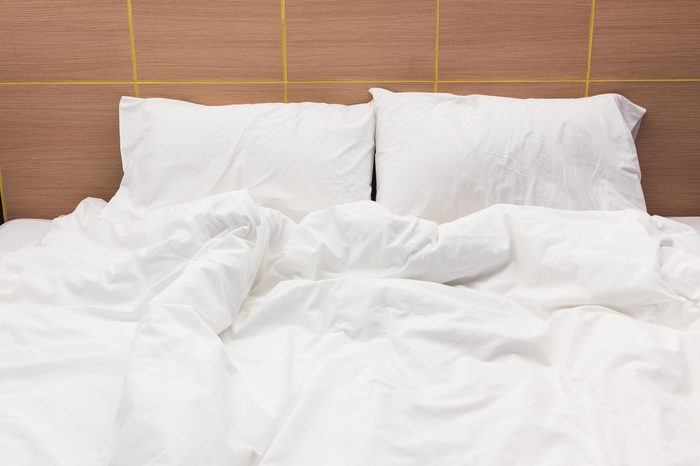
Sleeping on dirty sheets
“Even if they’re not stinky or visibly soiled, sheets need to be changed weekly,” says infectious disease specialist Natalie Ingmire, MSN, RN, director of quality and patient safety at Centura Health at Avista Adventist Hospital in Louisville, Colorado. Why? Dust mites. The mites themselves aren’t harmful to humans, notes Ingmire, but their droppings are known to trigger respiratory problems, especially in those with allergies to the mites. Learn more about why you need to wash your sheets every week.

Never wiping down your purse or wallet
How many times have you wiped down your wallet or purse? If you’re like most people, probably never. “You may not think to sanitize your purse, but you should,” says Ingmire. “All those important things that you keep in it—phone, keys, credit cards—come in daily contact with the world and can harbour all kinds of nastiness. A nurse will wipe down wallets, purses, and keys with a Clorox wipe once in a while.”
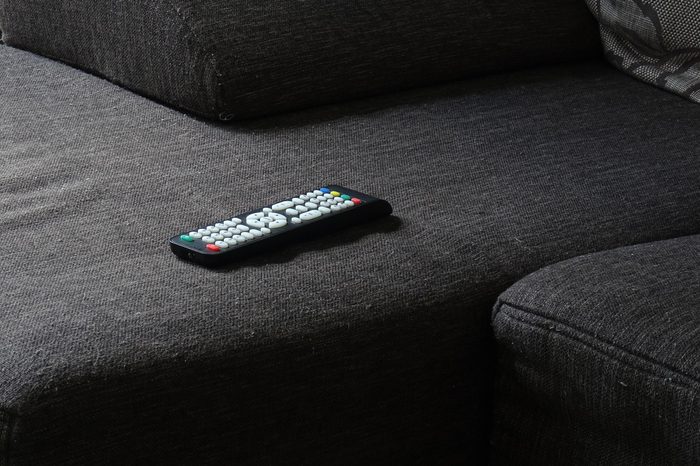
Ignoring the TV remote on cleaning day
“Even if you’re a good hand-washer, hands are rarely 100 percent clean at home, and the TV remote catches all those germs,” says Ingmire. “So wipe the remote down with a disinfecting wipe, especially on vacation when you have no clue as to the last time your hotel remote was sanitized.”
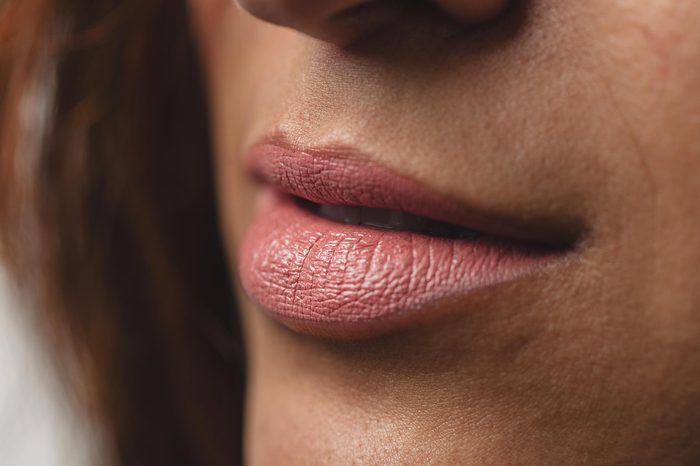
Borrowing a swipe of lip balm
“Sharing makeup or Chapstick is the quickest way to spread cold sores and other infections,” says Ingmire. “If I have an eye infection and you use my mascara, you’re getting it. And, if I keep using my own infected makeup, I’ll keep infecting myself!” So it’s important not to share makeup, and to throw yours away and replace it after an infection.
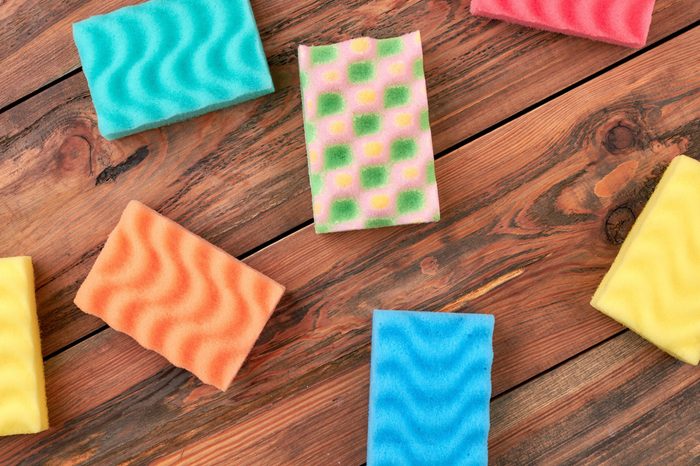
Using kitchen sponges for too long
“Sponges are the heavy lifter in the house in terms of clean up, but if you don’t replace them frequently, you’ll spread nasty stuff like salmonella everywhere,” warns Ingmire. Several studies have found high levels of bacteria in used kitchen sponges, including one published in 2017 in the journal Scientific Reports, that found several germs that can cause illness in people, including fecal bacteria (when this shows up in the kitchen, it’s usually from meats, not your own bathroom).
“I don’t own one and never will,” says Ingmire. But if you like using sponges to wash dishes and counters, be sure to disinfect them regularly. The Good House Keeping Institute and EMSL Analytical testing lab tested several different methods and found that the number one way to kill bacteria in your kitchen sponge is to soak it for five minutes in a mixture of 3/4 cup of bleach in one gallon of water, then rinse. The second-best method: Soak with water and microwave for one to two minutes.
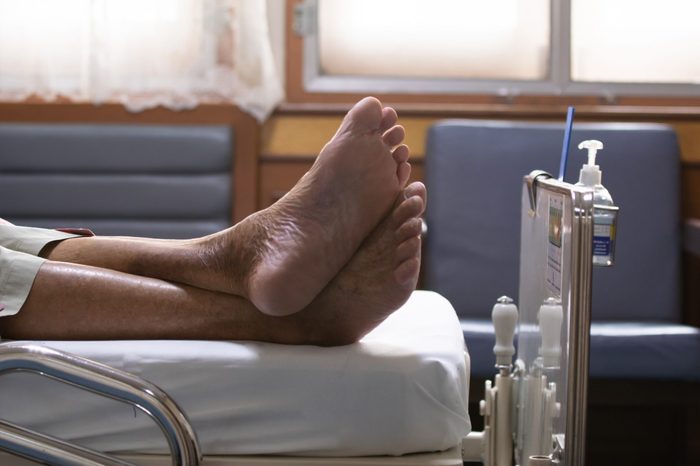
Keeping secrets from your medical provider
Being open and honest with your healthcare providers is incredibly important, but too many people let embarrassment or worry get in their way, says Melissa Rubio, PhD, APRN, a nurse practitioner at the Lung Health Institute. “Sometimes patients will answer what they think their provider wants to hear, rather than what is real,” says Rubio. You may say you don’t smoke or drink, for example, when you might do so occasionally in a social setting. Or you may say you eat healthier or get more exercise than you really do. (Keep in mind, the gym itself is a breeding ground for germs and bacteria that can make you sick.)
“When that happens, providers lose the opportunity to educate patients about a healthy lifestyle, especially if we already think you have a good handle on your health. Trust me, all of us can learn a thing or two about healthier living, and we also realize that our patients are human, and no one is perfect all the time.”
If you find yourself not being truthful because you don’t feel comfortable with your particular doctor or have had a bad experience with him or her, “it is perfectly OK to search for a provider who makes you feel comfortable, matches your energy and meets your needs,” says Rubio. “We are not offended if you feel that we are not a good match.”
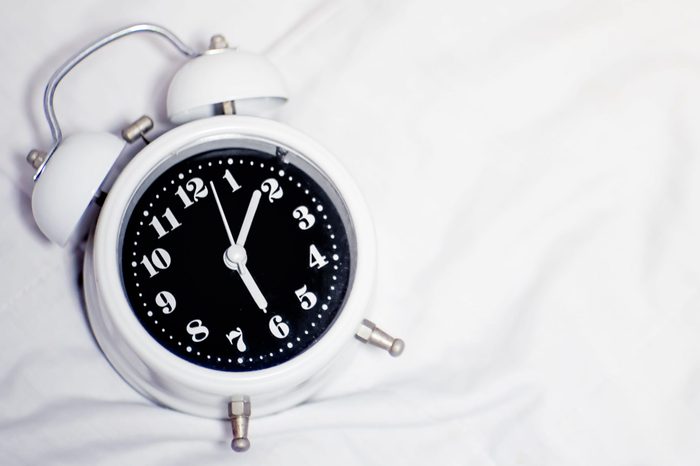
Not having a regular bedtime
“The current lack of respect for sleep in our society that suggests you’ll be able to catch up on sleep later is dead wrong. You can never fully catch up on missed sleep,” says Valerie E. Rogers, PhD, RN, CPNP, assistant professor, University of Maryland School of Nursing. “The chronic sleep deprivation we subject ourselves to on a daily basis has important consequences for health including weight gain, lowered ability to fight off infections, and poorer heart and digestive health.” Not only that, but lack of sleep can also take a serious toll on mental health and fuel depression and/or anxiety, says Campos. Most adults need between seven and nine hours of sleep, according to the National Sleep Foundation. One of the best ways to get it is to set a regular bedtime and stick to it. Or, incorporate these sleep-inducing products to help you fall asleep easier.
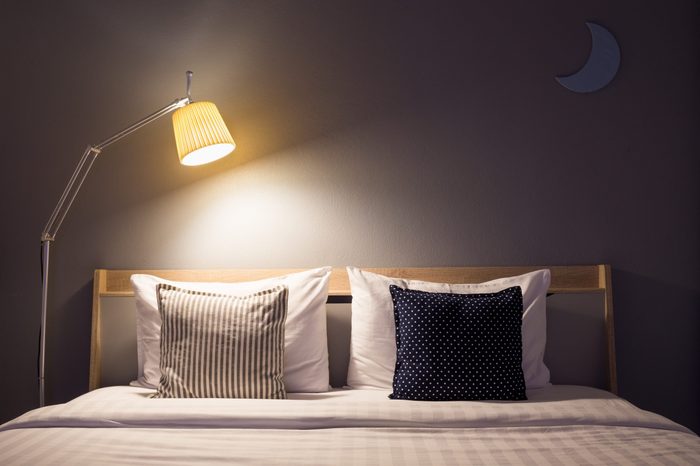
Getting too much light at night
“We are healthiest when we maintain our body’s alignment with the Earth’s day and night cycle,” says Rogers. Light from electronic devices and television can delay hormonal processes that help you get sleepy at night, leading to chronic sleep deprivation. “In the evening and at night, dim room lights and use programs on your electronic devices such as cell phones, tablets, and computers that dim the level of light emitted from screens.” Or, even better, just shut them off an hour before you intend to go to sleep. (FYI: This is exactly what blue light is doing to your health.)

Relying on alcohol to relax you
Don’t use alcohol as a sleeping aid, says Rogers. “The seduction of using alcohol to help you sleep is that it makes you feel sleepy and fall asleep easier. But as your blood alcohol level drops during the night, your sleep is repeatedly disturbed, and you’ll probably find you don’t feel well-rested in the morning.” Another reason you may feel groggy in the morning is that alcohol blocks REM sleep, the most restorative kind, according to the National Sleep Foundation. What’s more, alcohol relaxes muscles in your throat which increases snoring and can make sleep apnea worse. (Check out these serious health conditions that are linked to poor sleep.)
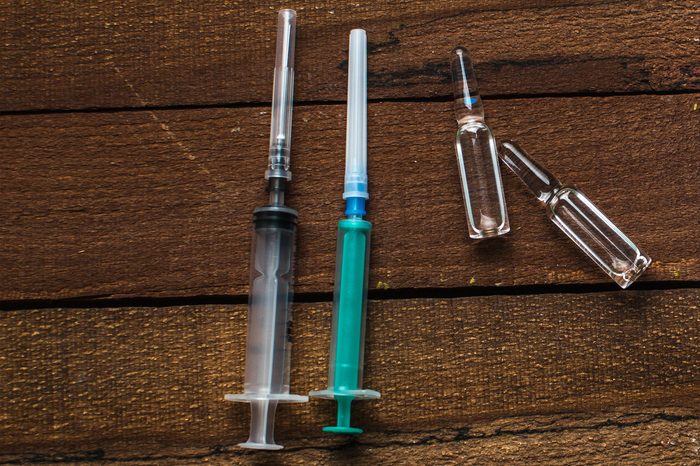
Skipping vaccinations
Staying up to date on vaccines is important for adults, not just kids, says pediatric nurse practitioner Patsy Stinchfield, RN, vice president of the National Foundation for Infectious Diseases. “Adults are an important part of the community immunity we all need—when adults protect themselves against vaccine-preventable diseases, they also protect others [by not getting sick and spreading the disease further],” explains Stinchfield. What’s more, “being current on vaccines can prevent an adult from getting very ill, missing school or work, and having unnecessary expenses related to being sick. Even healthy young adults can be struck with a life-ending disease such as influenza. Prevention is better than treatment.” As we age, the immunity gained from certain childhood vaccinations wanes, so she recommends that you review the recommended adult vaccination schedule from the Government of Canada, and check your vaccination history at your next doctor’s appointment.
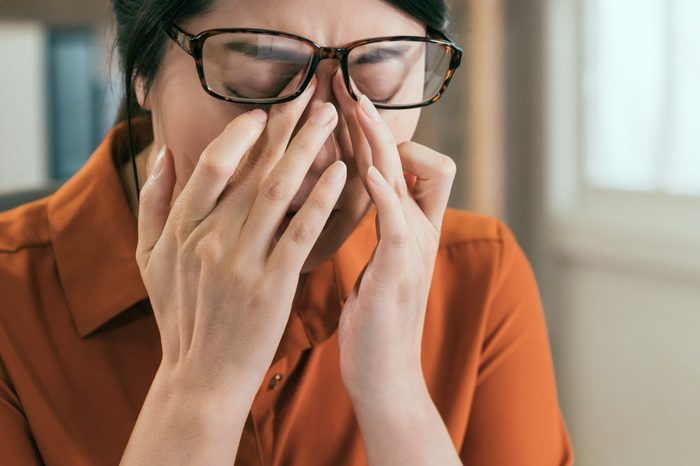
Rubbing your eyes
“I always preach to never rub your eyes—or pick your nose—with dirty hands,” says registered nurse Jackie Dardis, RN, BSN, a heart rhythm coordinator at UCHealth. Cold viruses enter the body through mucous membranes such as those in the nose and eyes, so you could be introducing infectious viruses that you’ve touched during the day directly into your body without knowing it. “You can sit next to somebody all day long that has a cold and not catch it if you never touch your face with unwashed hands.”

Driving drowsy
Driving while sleep deprived is incredibly dangerous, says Terry Cralle, RN, clinical sleep educator and Saatva sleep consultant. “I don’t even like the term drowsy driving because it does not sound as serious as it really is. According to the CDC, drowsy drivers have slower reaction times, pay less attention to the road and make poor decisions while driving.” Even worse, sleep deprivation impairs our clear thinking and insight. “So even when our performance plummets as a result of sleep deprivation, we will think we are performing just fine,” says Cralle. “Unfortunately, we are all busy and too often, the thing we skimp on is sleep.” Try one of these simple yoga poses to get a better night’s rest.
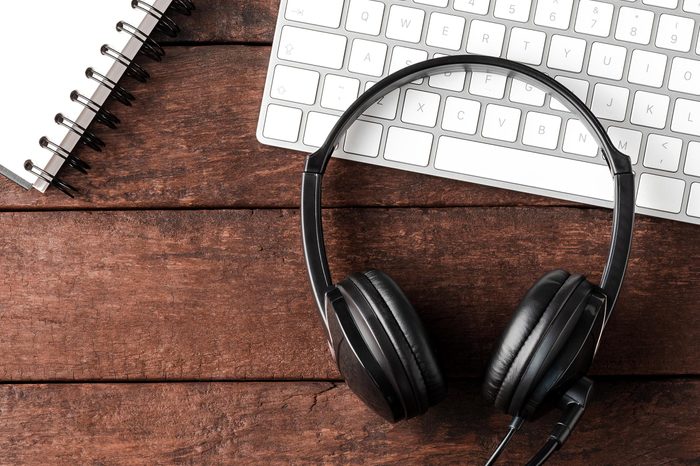
Blasting music in your headphones
Listening to too-loud music through your headphones can impair your hearing in two ways: high volume and prolonged duration, explains Ashley Wood, RN, BSN, a contributor at Demystifying Your Health. “It’s important to follow the basic rule that the louder the volume, the shorter the duration that you listen should be. In general, you should listen to music for no more than 60 minutes a day at 60 percent of the device’s maximum volume—this is known as the 60/60 rule. If you listen at max volume, it should only be for about five minutes a day. Both Android and iOS have apps that you can use to set volume controls. This is especially useful for parents who are concerned about their kids listening to music too loudly.”
If you use your headphones often in noisy places like city sidewalks, invest in a good pair of noise-canceling headphones, suggests Wood. “These are great because by reducing the amount of ambient noise, they allow you to listen to music at a lower volume than you would if you were using regular headphones. Your hearing is incredibly important and once the damage is done, it can’t be undone.”
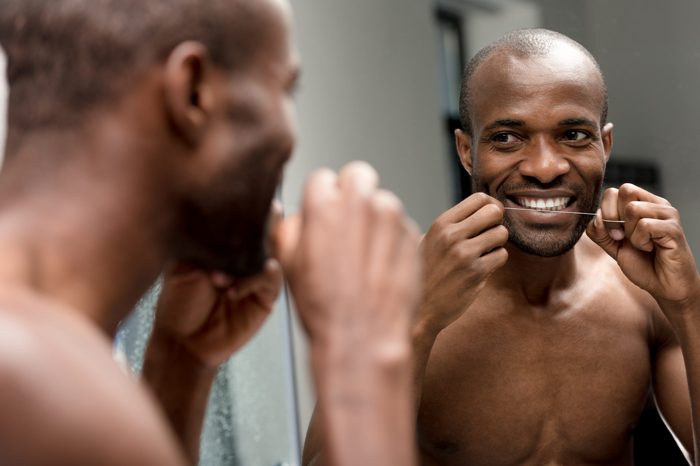
Brushing, but not flossing
Flossing isn’t just about the health of your teeth, says Wood. “The plaque that builds up on your teeth also builds up under your gum line and between your teeth. When there’s too much of it, you can end up with gum disease. This might not seem horrible, but it’s linked to other health issues, such as stroke, heart disease, and diabetes.” Here’s more on why you need to start taking your gum health more seriously.

Going overboard on booze
It can be easy to drink too much when you’re with friends you haven’t seen for a while, or at a party where the host keeps filling your glass, says Teri Dreher, RN, owner and CEO of NShore Patient Advocates. But even one drinking binge causes an elevation in liver enzymes, she says. And if this behaviour becomes more frequent or you start doing it when having strong negative emotions, there is an even greater risk: “Depression is made worse by alcohol. [And] as people get older, especially if they are alone, they may drift into alcoholism surprisingly easily. If you are in doubt about your drinking tendency, take the ’30 day challenge’ [where you abstain from alcohol for 30 days], and if you cannot abstain and need help, find a local AA meeting or rehab right away. Alcoholism does not only cause physical damage but heartbreaking family stress that can be remedied if caught in time. It is never too late to quit drinking.”

Letting people hold your newborn
“As a neonatal nurse practitioner who has cared for thousands of critically sick babies, this is one major thing I’d love to see new parents stop doing that puts their newborns at risk,” says Traci Powell, MSN, APRN, a neonatal nurse practitioner at Nemours in Clermont, Florida. “A newborn doesn’t have a developed immune system and hasn’t yet received vaccines. Things like one sneeze from a stranger, a snotty little toddler running by the stroller, or even a grandma type in the baby’s face who doesn’t yet know that the next day she’ll be hit with the flu that’s cranking up in her body could all cause the baby to end up in intensive care with severe infection and possibly even meningitis causing permanent neurological damage at best and death at worse. Parents need to keep their newborns safely at home while their immune systems build.”

Not washing up after pumping gas
How many times have you stopped to sanitize or wash your hands after filling your car with fuel? “This is a small change that can make a big difference,” says emergency room nurse Lauren Mochizuki, RN. “Imagine all the different people that touch the pump every day. Now imagine taking all those germs, and ingesting them the next time you eat after you haven’t washed your hands! That pump can host a variety of different bacteria. S. pneumoniae and S. Pyogenes can live on inanimate objects for an extended time, and this is an easy way to contract strep throat or a respiratory infection.”
Now that you’ve learned how nurses stay healthy, next check out the most germ-infested things you touch every single day.
